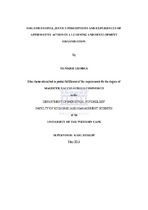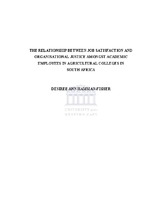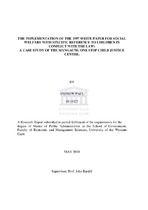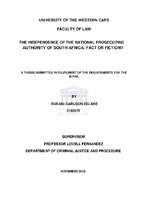| dc.contributor.advisor | Heslop, Karl | |
| dc.contributor.author | George, Munique | |
| dc.contributor.other | Dept. of Industrial Psychology | |
| dc.contributor.other | Faculty of Economics and Management Sciences | |
| dc.date.accessioned | 2013-08-02T11:41:10Z | |
| dc.date.available | 2011/11/01 14:24 | |
| dc.date.available | 2011/11/01 | |
| dc.date.available | 2013-08-02T11:41:10Z | |
| dc.date.issued | 2011 | |
| dc.identifier.uri | http://hdl.handle.net/11394/1781 | |
| dc.description | Magister Commercii (Industrial Psychology) - MCom(IPS) | en_US |
| dc.description.abstract | There have been good arguments made for the development of aggressive affirmative action policies with the end goal of quickly moving black South Africans into corporate and high ranks within management of organisations. One of the central arguments in favour of aggressive AA policies is the risk of racial polarization post-apartheid should a quick fix not be initiated. It makes good business and economic sense for AA policies to be implemented as black consumers coupled with black managers will have the eventual end point of lower unemployment and crime, through job creation and security of the representative majority. | en_US |
| dc.language.iso | en | en_US |
| dc.publisher | University of the Western Cape | en_US |
| dc.subject | Affirmative action | en_US |
| dc.subject | Distributive Justice | en_US |
| dc.subject | Procedural Justice | en_US |
| dc.subject | Interactional Justice | en_US |
| dc.subject | Perceptions | en_US |
| dc.subject | Organisational Justice | en_US |
| dc.subject | Equal opportunities | en_US |
| dc.subject | Diversity | en_US |
| dc.subject | Fairness | en_US |
| dc.title | A study of investigating organisational justice perceptions and experiences of affirmative action in a learning and development organisation | en_US |
| dc.type | Thesis | en_US |
| dc.rights.holder | University of the Western Cape | en_US |
| dc.description.country | South Africa | |




